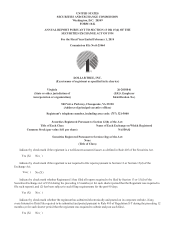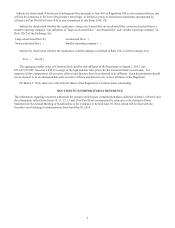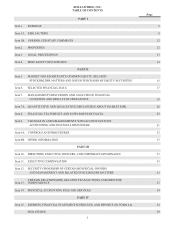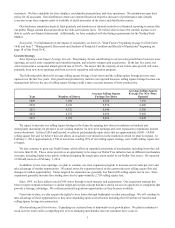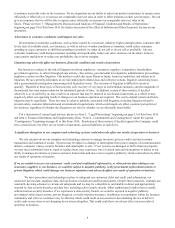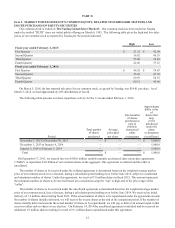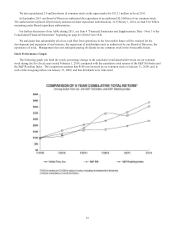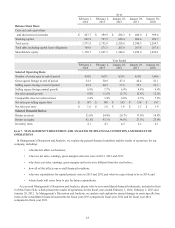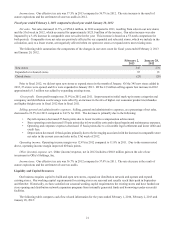Dollar Tree 2013 Annual Report Download - page 27
Download and view the complete annual report
Please find page 27 of the 2013 Dollar Tree annual report below. You can navigate through the pages in the report by either clicking on the pages listed below, or by using the keyword search tool below to find specific information within the annual report.11
• Shipping costs. We could experience increases in shipping rates imposed by the trans-Pacific ocean
carriers. Changes in import duties, import quotas and other trade sanctions could increase our costs.
• Diesel fuel costs. We have experienced volatility in diesel fuel costs over the past few years, which could recur
unexpectedly, at any time.
• Vulnerability to natural or man-made disasters. A fire, explosion or natural disaster at a port or any of our
distribution facilities could result in a loss of merchandise and impair our ability to adequately stock our
stores. Some facilities are vulnerable to earthquakes, hurricanes or tornadoes.
• Labor disagreement. Labor disagreements, disruptions or strikes may result in delays in the delivery of
merchandise to our distribution centers or stores and increase costs.
• War, terrorism and other events. War and acts of terrorism in the United States, the Middle East, or in China or
other parts of Asia, where we buy a significant amount of our imported merchandise, could disrupt our supply chain
or increase our transportation costs.
• Economic conditions. Suppliers may encounter financial or other difficulties.
Our profitability is affected by the mix of products we sell.
Our gross profit margin could decrease if we increase the proportion of higher cost goods we sell in the future. In recent
years, the percentage of our sales from higher cost consumable products has increased and we can give no assurance that this
trend will not continue. As a result, our gross profit margin could decrease unless we are able to maintain our current
merchandise cost sufficiently to offset any decrease in our product margin percentage. We can give no assurance that we will
be able to do so.
Pressure from competitors may reduce our sales and profits.
The retail industry is highly competitive. The marketplace is highly fragmented as many different retailers compete for
market share by utilizing a variety of store formats and merchandising strategies. We expect competition to increase in the
future. There are no significant economic barriers for others to enter our retail sector. Some of our current or potential
competitors have greater financial resources than we do. We cannot guarantee that we will continue to be able to compete
successfully against existing or future competitors. Please see Item 1, “Business,” beginning on page 5 of this Form 10-K for
further discussion of the effect of competition on our operations.
Our business could be adversely affected if we fail to attract and retain qualified associates and key personnel.
Our growth and performance is dependent on the skills, experience and contributions of our associates, executives and key
personnel. Various factors, including overall labor availability, wage rates, regulatory or legislative impacts, and benefit costs
could impact the ability to attract and retain qualified associates at our stores, distribution centers and corporate office.
Failure to comply with our debt covenants could adversely affect our capital resources, financial condition and liquidity.
Our debt agreements contain certain restrictive covenants, which impose various operating and financial restrictions on us.
Our failure to comply with the restrictive covenants in our debt agreements could result in an event of default, which, if not
cured or waived, could result in us having to repay our borrowings before their due dates. If we are forced to refinance these
borrowings on less favorable terms or if we were to experience difficulty in refinancing the debt prior to maturity, our results of
operations or financial condition could be materially affected.
Certain provisions in our Articles of Incorporation and Bylaws could delay or discourage a takeover attempt that may be in
a shareholder's best interest.
Our Articles of Incorporation and Bylaws currently contain provisions that may delay or discourage a takeover attempt that
a shareholder might consider in his best interest. These provisions, among other things:
• provide that only the Board of Directors, chairman or president may call special meetings of the shareholders;
• establish certain advance notice procedures for nominations of candidates for election as directors and for shareholder
proposals to be considered at shareholders' meetings;
• permit the Board of Directors, without further action of the shareholders, to issue and fix the terms of preferred stock,
which may have rights senior to those of the common stock.
However, we believe that these provisions allow our Board of Directors to negotiate a higher price in the event of a
takeover attempt which would be in the best interest of our shareholders.


